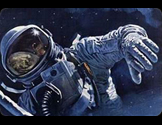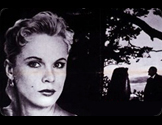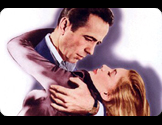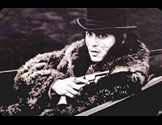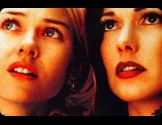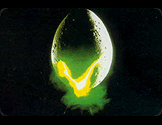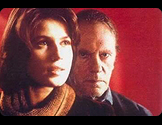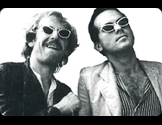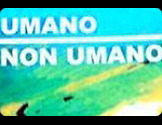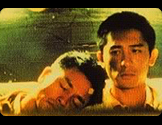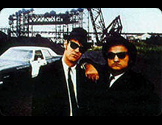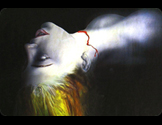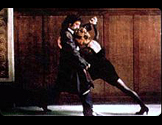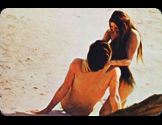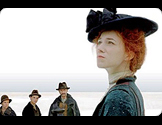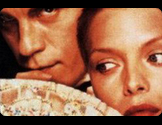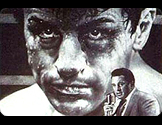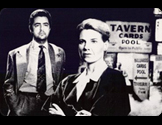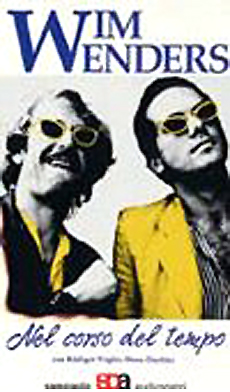
NEL CORSO DEL TEMPO (Im Lauf Der Zeit)
è un film del 1975 diretto da Wim Wenders
TRAMA
Bruno, “king of the road”, un riparatore di proiettori cinematografici che vive sul suo camion, soccorre un uomo, Robert, detto “kamikaze”, che ha tentato uno strano suicidio. Insieme i due vagano per la Repubblica Federale; qualche avventura occasionale, discorsi, silenzi riempiti dal rock, incontri con i gestori delle sale, fino a quando, sul confine tra le due Germanie, i due si separano.
Girato fidandosi molto dell’improvvisazione, il film è una riflessione sulla morte dei padri e su quella del cinema.
da Il Mereghetti. Dizionario dei film 2011,
di Paolo Mereghetti, Dalai Editore, Milano, 2010.
NEL CORSO
DEL TEMPO*
regia di Wim Wenders
di Giampaolo Ragnoli
Nella tipografia. Interno notte.
Mezzototale laterale di Ted che cerca le lettere per un titolo in una grande cassetta tipografica.
Una lampadina sul soffitto illumina la scena.
Mezzototale e lieve movimento di gru. Parte la musica
(Robert Wyatt, Memories).
Ted ha inserito nella stampatrice una pagina composta, chiude il coperchio e si alza.
Mezzototale, breve movimento di gru verso l'alto e carrello indietro.
Ted inserisce un foglio di carta nella stampatrice.
Totale: Ted fa partire la macchina.
Dettaglio del titolo di testa de L'Involucro: Memories.
I know I cannot leave this place
full of
memories
Things like the way they knew us
all over
town
We used to walk the streets together
We could be seen
Past shops where people knew us
Yeah, people knew
I've got to choose between tomorrow
and yesterday
I can't stop to think about
my life, here today
Maybe I'll find someone to get you
off my mind
Take me away from here
and leave it, leave it all behind
Memories can hang you up and haunt you
all your life, you know
Get so you cannot stay
and yet cannot go
I could find out where she's gone
Today I feel so unhappy
Streets seem so empty now
I want you with me
Ravvicinato di 3/4 di Ted che legge:
“Sulla stessa cassetta c’è un pezzo di
Ewan McColl, The Thirty Foot Trailer, sugli
zingari, nella versione degli Watersons. McColl dedicò una
radio ballad, che poi divenne un disco, The Travelling People,
ai nomadi, ai travellers degli anni Sessanta.
Come
sempre usare l’intelligenza, capire, spiegare, far conoscere,
dialogare sono gli strumenti più efficaci contro
l’ignoranza, la grettezza, la chiusura, l’odio,
tutto quello che sta crescendo intorno a noi in una misura che mi
preoccupa sempre di più.”
The old ways are changing you cannot deny
The day of the traveller's over
There's nowhere to gang and there's nowhere to bide
So farewell to the life of the rover
Goodbye to the tent and the old caravan
Tae the tinker, the rover, the travelling man
And goodbye tae the thirty foot trailer
Farewell tae the cant and the travelling tongue
Farewell tae the Romany talking
The buying, the selling, the old fortune telling
The knock on the door and the hawking
You got to move fast to keep up with the times
For these days a man cannot dander
There's a bylaw to say you maun be on your way
And another to say ye can't wander
Farewell to the blossom and besoms of broom
Farewell tae the creels and the baskets
The folk of today would far rather pay
For a thing that is made oot o plastic
The old ways are passing and soon will be gone
And progress is aye a big factor
Its sent to afflict us and when they evict us
They tow us away wi a tractor
Farewell tae the pony, the cob, and the mare
The reins and the harness are idle
You don't need a strap when you're breaking up scrap
So farewell tae the bit and the bridle
Farewell tae the fields where we've sweated and toiled
At pulling and hauling and lifting
They'll soon have machines and the travelling queens
And their menfolk had better be shifting
Totale frontale di un maggiolino Volkswagen che entra nel paese.
Mezzototale: Ted con un braccio su un finestrino e gli occhiali scuri siede un po' intontito nell'automobile.
Mezzototale: la MdP riprende frontalmente Ted che scende dalla macchina.
L'autista, Peter, rimane seduto. Ted rolla una sigaretta, Peter accende la radio:
Blue, songs are like tattoos
You know I’ve been to sea before
Crown and anchor me
Or let me sail away
Hey blue, here is a song for you
Ink on a pin
Underneath the skin
An empty space to fill in
Well there’re so many sinking now
You’ve got to keep thinking
You can make it thru these waves
Acid, booze, and ass
Needles, guns, and grass
Lots of laughs, lots of laughs
Everybody’s saying that hells the hippest way to go
Well I don’t think so
But I’m gonna take a look around it though
Blue, I love you
Blue, here is a shell for you
Inside you’ll hear a sigh
A foggy lullaby
There is your song from me
Ted e Peter si guardano, non dicono nulla.
Pensano a una notte lontana, passata ad ascoltare Blue (l'album) e a parlare di Susy e di She.
A un tratto Ted ricorda che a una sua festa di compleanno Martha scelse di leggere il testo di Blue.
Forse le donne sono magiche, forse vengono da un altro pianeta.
Capirsi è sempre (sempre?) stato difficile ma, come scrive Walter Benjamin, “la tradizione degli oppressi ci insegna che lo stato di emergenza in cui viviamo è la regola”.
Mezzototale frontale di Ted che chiude il libro che sta leggendo, accenna un mezzo sorriso e accende.
Totale. Dissolvenza. Schermo nero. Titoli di coda.
Parte la musica.
(David Crosby, I'd Swear There Was Somebody Here)
* Liberamente ispirato alle prime scene del film



